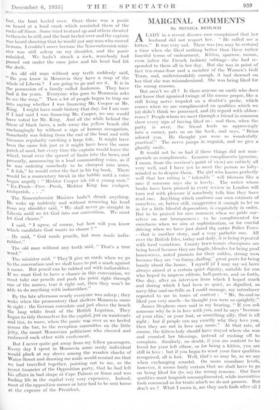MARGINAL COMMENTS
By MONICA ,REDLICH
ALADY in a recent divorce case complained that her husband did not respect her. " He called me a kitten." It was very sad. There was (we may be certain) a time when she liked nothing better than these rather fanciful terms of endearment. Kitten, sparrow, mouse, even (after the French fashion) cabbage—she had re- sponded to them all in her clay. But she was in point of fact ten-stone-four and a member of the Women's Golf Team, and, understandably enough, it had dawned on her that she was misunderstood. She was being liked for the wrong reasons.
, But aren't we all ? Is there anyone on earth who does not know that agonised twinge of the amour propre, like a still living nerve impaled on a dentist's probe, which comes when we are complimented on qualities which we (a) didn't think we possessed, and (b) regard with abhor-. rence ? People whom we meet through a friend in common show every sign of having liked us : and then, when the party is over, the friend leads us approvingly into a corner, pats us on the back, and says, " Brian adored you. . He thought you were so wonderfully practical." The nerve jumps in anguish, and we give a ghastly smile. It would not be so bad if these things did not mas- querade as compliments. Genuine compliments (genuine, I mean, from the receiver's point of view) are entirely all very well, and I have yet to meet the person so lofty- , minded as to despise them. The girl who knows perfectly well that her rating is " tolerable " will blossom like a rose if someone says she is lovely. The writer whose books have been praised in every review in London will turn red with pleasure if somebody tells him they have read one. Anything which confirms our own estimate of ourselves, or, better still, exaggerates it enough to let us in for a little blissful deprecation, is exquisitely in order. But to be praised for nice manners when we pride our- selves on our brusqueness to be complimented for sweetness when we aim at sophistication, or for careful. driving when we have just dared the entire Police Force —that is another story, and a very pathetic one. All over the British Isles, today and daily, it is being repeated with local variations. County lawn-tennis champions are being loved because they arc fragile, blondes for being good housewives,. noted pianists for their ankles, strong men because they are "so funny, darling," great poets for being handy about the house. I myself (if I may say so) have always aimed.. at a certain quiet dignity, suitable for one who hoped to impress editors, hall-porters, and. so forth.: One day, after an interview from which I hoped much and during which I had been as quiet, as dignified, as navy-blue-and-no-frills as 1 could manage, my introducer' reported to me in tones of content " Mr. So-and-so' liked you very much—he thought you were so sprightly," James Stephens once said in my hearing, " If you ask someone why he is in love with you, and he says because. of your chin,' or your foot, or something silly, that is all right ; but if people can .say exactly why they love you, then they arc not in love any more." At that rate, of course, the kitten-lady should have stayed where she was and counted her blessings, instead of rushing off to complain. Similarly, no doubt, if you .are content to be loved for your left elbow, or for being a kitten, you are Still in love : but if you begin to want your finer qualities recognised, all is lost. Well, that's as may be, as we say. when , exchanging scandal. On. more .mundane levels, however, it seems_ fairly certain. that we shall have to go on being liked for (to us) the wrong reasons. Our finer qualities must languish uncomplimented, while insensitive fools commend us for traits which we do not possess. But don't we ? What I mean is, are they such fools after all ?












































 Previous page
Previous page